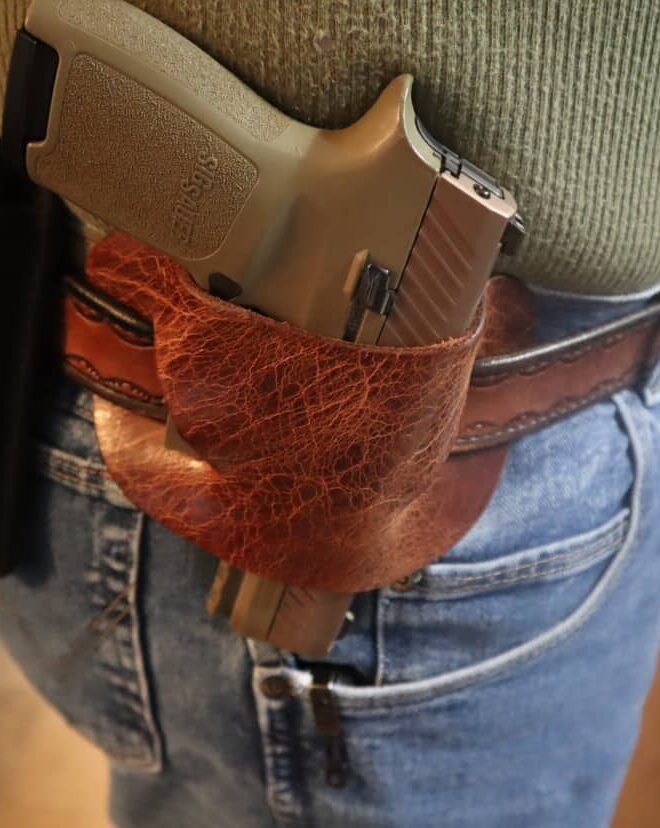South Carolina’s legislature passed a bill allowing open carry with training, and Governor Henry McMaster signed it into law May 17, 2021. The new law went into effect August 15, 2021.
Now that you have the legal right to carry your weapon openly, should you try it? Consider these factors before you strap on that outside-the-waistband holster and hit the streets.
- Your comfort level with a gun
- Your ability to fend off an attacker who sees your guns and wants it
- Your willingness to face the criticism of strangers
- Whether you are visiting a place where guns are welcome
- Whether open carry is common in the place you are visiting
- Whether you have a place to store your gun if it is prohibited at your destination
Are You Comfortable With Your Gun?
When you watch the Old West gunslingers in the movies, you get a sense that they only remove their firearms for a weekly bath, and then it stays in a holster next to the tub. If you don’t think of your gun as your constant companion, you might not want to have it out in the open.
The first time I carried my gun with me after I got my Concealed Weapons Permit (CWP), I felt as conspicuous as a swimsuit model in a monastery. No one saw my gun or asked me any questions, and gradually I became less and less self-conscious about carrying it.
I would not recommend a new gun owner begin by carrying openly because of the awkwardness involved. You will end up drawing attention to yourself and there actually will be something to see. In addition to drawing the ire of people who don’t believe you need a gun, you are going to make seasoned gun owners nervous. Wait a while before you try open carry.
Can You Retain Your Weapon If Attacked?
The great thing about concealed carry is anonymity. A trained observer might be able to spot your weapon due to telltale bulges and protective behaviors, but the general public is blissfully unaware that you have the means to protect yourself.
When you declare your weapon by wearing it in the open, you evoke one of two responses from criminals. Some of them will choose to avoid you because you are not an easy target. Others will attack you first to remove the threat.
There are ways to retain your weapon under duress, and those will now be covered in CWP classes in South Carolina. We will discuss those tactics in upcoming articles, but for now you need to assess what you already know.
Police and military personnel receive specific training on how to keep others from taking their firearms. Before you carry openly, consider taking a class in firearm retention. It’s a lot better to know how to retain your gun than to wonder whether you can.
Can You Handle Criticism?
Anything done publicly is likely to be criticized by someone. If you don’t want to hear all the reasons why guns are dangerous, you might not want to carry your firearm openly.
Seasoned gun owners may also have something to say about the way you carry your gun. My advice is to listen to what they say. It is easy as a new gun owner to develop bad habits, and you must follow the four rules of gun safety all the time. Here’s the quick version:
- Never point your gun at something you are not willing to destroy
- Keep your finger away from the trigger until it is time to shoot
- Know your target and what is beyond it
- Treat all guns as if they are loaded
Is Your Gun Welcome?
You should not carry concealed in a place where proper warnings are posted prohibiting a weapon, but you might get away with it if you accidentally carry your concealed weapon into a gun free zone. In that situation you can just excuse yourself and get out with no fuss.
If you accidentally walk into a gun free zone with your weapon displayed on your hip, you may get a quick and unfriendly welcome from the owner of the business, or a security guard, or a member of the police force. That’s going to be embarrassing, inconvenient, and possibly expensive.
Even in a place where guns are allowed, you may find yourself surrounded by unsympathetic glances. Be aware of the social and political leanings of your destination and plan accordingly. More exposure to open carrying individuals will eventually soften the response of the general public, but let the process start with someone who is ready for the experience.
Are Others Carrying Openly?
If you attend an NRA (National Rifle Association) rally, there’s a pretty good chance you will find a few people carrying openly. If it’s an NEA (National Education Association) meeting, you’re not going to find many people wearing firearms. Know your environment.
Do You Have a Backup Plan?
If you end up in a place where carrying a weapon is prohibited, you have to get out of there. Ideally you can return to your vehicle and stow the gun out of sight in a locked compartment. If you are going to carry openly on a routine basis you need to plan out your trips with this contingency in mind.
You may have figured out by now that I am not going to advise most people to carry a gun openly. It’s great that we have asserted our Second Amendment right to carry our weapons out in the open, and some people will do so successfully. Public acceptance of guns will increase as people begin to see guns and learn that the presence of a gun does not automatically lead to a crime.
But having the right to do something does not always mean that you should do that thing. I have the right to dye my hair purple, but I have no desire to assert that right at present. Later, perhaps, I might.
Get Your Training
If you have questions about open carry or any other firearms-related issue, consider spending some time with a firearms instructor.
Keep reading my blog, and watch our Double Eagle Gunworks channel on YouTube for free videos on all sorts of helpful topics.
Thanks for reading!


